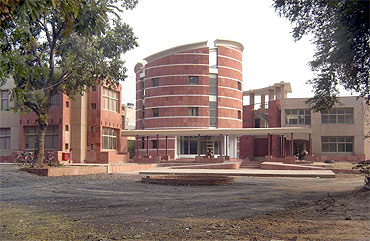Photographs: Courtesy: http://www.jmi.ac.in/
The Jamia Millia Islamia University was on Tuesday granted minority institution status by the National Commission for Minority Educational Institutions, a first for any central university which will allow it to reserve up to 50 per cent seats for Muslims.
"We have no hesitation in holding that Jamia was founded by the Muslims for the benefit of the Muslims and it never lost its identity as a Muslim minority educational institution," chairman of the commission Justice M S A Siddiqui said in his judgment.
The varsity will no longer have to give reservation to Scheduled Caste and Scheduled Tribe students following the ruling by the commission, a quasi-judicial body, on the petitions by Jamia Students Union, Jamia Old Boys Association and Jamia Teachers Association filed in 2006, seeking minority status for the varsity.
Jamia became a central university by an Act of Parliament in 1988. Siddiqui said Jamia would continue to enjoy the Central University status and be the only 'minority central university' in the country given its unique character.
"We find and hold that Jamia Millia and Islamia is a minority educational institution covered under Article 30 (1) of the Constitution of India with section 2(G) of the National Commission for Minority Educational Institutions Act," the judgment said.
The institute was founded even before the Constitution was in place, it said.
"No other reservation would be binding on the varsity," said counsel for the petitioners in the case Tarique Siddiqui, citing Article 15 (5) of the Constitution.
'Jamia was founded by Muslims for the benefit of Muslims'
Image: Jamia Millia Islamia UniversityPhotographs: Courtesy: http://www.jmi.ac.in/
Jamia was established for the purpose of keeping Muslim education in Muslim hands, entirely free from external control. Thus the Muslim community brought Jamia into existence in the only manner in which a university could be brought into existence, the judgment said. After delivering the judgment, Justice Siddiqui told reporters, "We decided the case within the legal parameters".
The Commission in its judgment held, "On a conjoined reading of Section 2(O) and 4 of the Jamia Millia Islamia Act along with the history and facts and events which led to the Establishment of Jamia, we have no hesitation in holding that Jamia was founded by the Muslims for the benefit of the Muslims and it never lost its identity as a Muslim minority educational institution".
The other members of the commission are Mohinder Singh and Cyriac Thomas. The intervener in the case was Confederation of Muslims Educational Institutions of India while the respondents were the vice chancellor of Jamia, the human resource development and minority affairs ministries.
The commission observed, "The history leads to one conclusion and one conclusion only that Jamia was established by Muslims, for Muslims, though non-Muslims could be admitted."
"The Muslim community brought the Jamia into existence in the only manner in which a university could be brought into existence," said the ruling, adding that they "provided lands, buildings and endowments for the Jamia, and without these, the Jamia as a body would be an unreal abstraction."
It also pointed out that even the human resource development ministry has issued a directive reserving 50 per cent seats in the institution for the minority Muslim community.
"By issuing the said direction, the HRD ministry has impliedly recognised the factual position related to the minority status of the Jamia," the NCMEI said.
'Founders wanted Muslims to keep education in their own hands'
Image: Jamia Millia Islamia UniversityPhotographs: Courtesy: http://www.jmi.ac.in/
The NCMEI held that the Supreme Court ruling in Aziz Basha case, which upheld the relevant law conferring central university status on Aligarh Muslim University, has no bearing on the case of Jamia Millia Islamia.
The NCMEI said that till enactment of relevant law for establishment of AMU as a central university in 1920, AMU existed only in form of a college - Mohammadan Anglo-Oriental College and evidently it was not set up by Muslim community.
The Jamia Millia Islamia, however, was set up by Muslim community, said the MCMEI ruling, detailing the history of its establishment.
"In the instant case, the Jamia did not owe its very existence to a statute. As stated earlier, since its foundation in 1920 till enactment of the Jamia Millia Islamia Act, (in 1988) Jamia never lost its identity," the ruling said.
It added that "even prior to the enactment of the Act, Jamia had a legal existence of its own."
Detailing Jamia's history, the ruling said, "It was founded in 1920 by national leaders like Maulana Mohemmad Ali Jauhar and Hakim Ajmal Khan, as they wanted the Muslims to keep their education in their own hands, entirely free from governmental interference."
Hit by financial crisis in 1925, Jamia moved to Delhi, where it survived with support from leaders like Hakim Ajmal Khan, Dr M A Ansari, Khwaja Abdul Majeed, Dr Zakir Husain, Abid Hussain and Professor Mohd Mujeeb etc.
In 1939, some Muslim teachers of the Jamia constituted a society and got it registered under the Societies Registration Act, 1860 as the Jamia Millia Islamia Society. In 1962, the UGC accorded Jamia the status of a deemed university under the University Grants Commission Act and on persuasion of the Muslim Community, the Jamia was given the status of a Central University under the Jamia Millia Islamia Act, 1988.




article